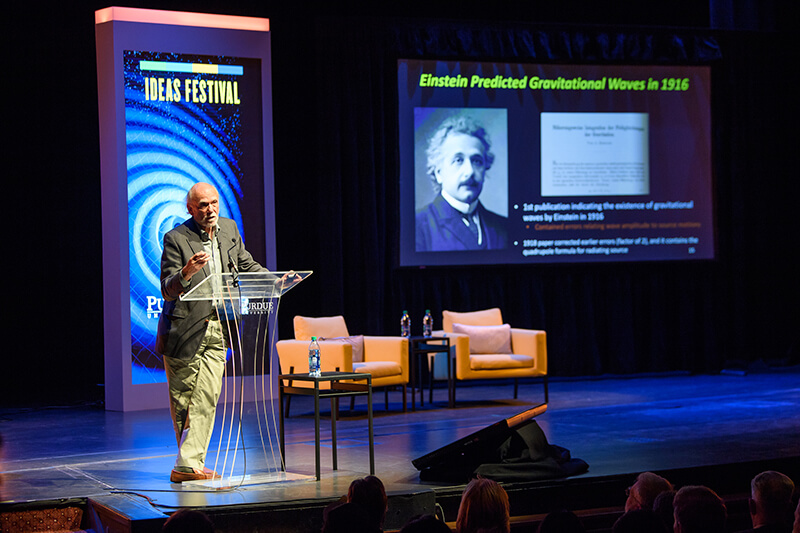October 18, 2018
Nobel Prize winner Barry Barish discusses 'What if we could hear gravity?' at Ideas Festival event

Experimental physicist Barry Barish presents “What if We Could Hear Gravity: The Detection of Gravitational Waves from Colliding Black Holes” on Oct. 17 in Stewart Center’s Loeb Playhouse. (Purdue University photo/Rebecca Wilcox)
WEST LAFAYETTE, Ind. — The 2017 Nobel Prize winner in physics discussed “What if we could hear gravity?” as part of Wednesday's (Oct. 17) Ideas Festival event at Purdue University.
Experimental physicist Barry Barish presented “What if We Could Hear Gravity: The Detection of Gravitational Waves from Colliding Black Holes” in Stewart Center’s Loeb Playhouse.
Barish’s presentation is aligned with Purdue’s Giant Leaps Sesquicentennial Campaign and is part of the Ideas Festival theme, Giant Leaps in Space: Earth, Exploration, Economics. The Ideas Festival is the centerpiece of the campaign and connects world-renowned speakers and Purdue expertise in a conversation on the most critical problems and opportunities facing the world.
On Sept. 14, 2015, gravitational waves were observed for the very first time. The waves, which were predicted by Albert Einstein 100 years ago, came from a collision between two black holes. It took 1.3 billion years for the waves to arrive at the Laser Interferometer Gravitational-Wave Observatory detectors in the United States. LIGO is a collaborative project with more than 1,000 researchers from more than 20 countries, and Barish was the lead principal investigator. Together, the researchers realized a vision that is almost 50 years old.
“Gravitational waves are direct testimony to disruptions in space-time itself,” said David Koltick, Purdue professor of physics and astronomy. “This is something completely new and different, opening up unseen worlds. A wealth of discoveries awaits those who succeed in capturing the waves and interpreting their message.”
Barish, who is the Linde Professor of Physics Emeritus at California Institute of Technology, also will give a more technical lecture at the Hubert M. James Memorial Lecture at 4:30 p.m. today (Oct. 18) in the Physics Building, Room 114.

